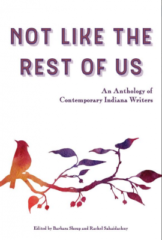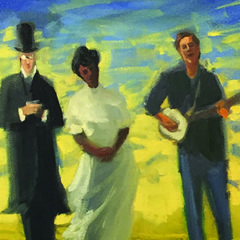My Hoosier Identity
2016 is Indiana’s bicentennial year, and I’m really honored to have work in two projects that celebrate my home state.
 The book
The book
First, there’s this anthology of contemporary Indiana writers. My contribution was the essay about growing up in Cole Porter’s hometown which I published in the Lit Hub a few months ago.
This week, the Munsonians (people from Muncie!) in that anthology are giving a reading and selling books, so you if you live close by, please come! Here’s the Facebook event for the reading.
The play
Second, there’s an anthology of short plays set in Indiana that will premiere at the Indiana Repertory Theatre. It’s called Finding Home. 
It features some famous Hoosiers like James Dean, James Whitcomb Riley, etc. But my contribution is about a common Hoosier family trying to make it through a railroad strike.
They had so much material, they decided to split the performances in two: Blue shows and Gold shows. Mine is in the Gold show, and I’ll be there on Sunday, Oct. 23 at 2 pm for the premiere and on Sunday Nov. 6 at 2 pm for the talk back. Maybe I’ll see you there?
My Hoosier Identity
Appropriately, I’ve been thinking a lot about why being from Indiana is such an integral part of my identity as a person and as a writer.
This certainly wasn’t the case when I was growing up. All I wanted was to leave. I associated having a Hoosier identity with being a “town person.” Here, read this.
I wrote my first stories in college, before I left Indiana, and although all of these stories were set in Indiana, that fact wasn’t actually on the page. As the saying goes, I was a fish who didn’t know she was swimming in water.
That water, by the way, is “culture.”
I left Indiana at age 22 to go to graduate school. Jumped from the Wabash River to the Black Warrior River, and the contrast between those two cultures made me deeply aware of my home waters for the first time in my life.
(This line from the state song always makes me verklempt: When I dream about the moonlight on the Wabash, then I long for my Indiana home.)
From the Black Warrior, I jumped into the Blue Earth River in Minnesota.
Then I jumped into the Delaware River, which forms the boundary between New Jersey and Pennsylvania.
Then I jumped again. To the place where the Monongahela, the Allegheny, and the Ohio Rivers converge.
I loved living in each of these places. I loved how moving away allowed me to see Indiana with greater clarity. But the truth is that the only time I really felt like myself during that 20-year period was in the summer, when I went home to Indiana to visit my family.
That’s when “being a Hoosier” wasn’t what set me apart from the people around me. It’s what made me the same. It was–I don’t know how to describe it–such a relief to swim in familiar waters.
There’s a quote I keep pinned on the bulletin board above my desk:
Art is beholden to the kiln in which the artist was fired.
That’s August Wilson, the playwright whose 10-play Pittsburgh Cycle tells the story of the African-American experience in each decade of the 20th century.
I like that quotation because it’s saying that who and what we are is a product of where we and when we’ve come. It’s baked into us. Nothing to do be done about that. And that the art we make is a product of that kiln, that fire.
I’m not sure how I found that quotation, but it resonated with me deeply. So, as I was writing this post, I Googled to find out where it came from. It’s from an essay that was published in the New York Times in 2000. And wouldn’t you know it–Wilson used the metaphor of water, too.
I had conceived a much longer story that spoke to the social context of the artist and how one’s private ocean is inextricably linked to the tributary streams that gave rise to, and occasioned, the impulse to song.
Before one can become an artist one must first be. It is being in all facets, its many definitions, that endows the artist with an immutable sense of himself that is necessary for the accomplishment of his task. Simply put, art is beholden to the kiln in which the artist was fired.
Before I am anything, a man or a playwright, I am an African American. The tributary streams of culture, history and experience have provided me with the materials out of which I make my art.
My charge
One of my biggest complaints about Midwestern literature is how often it comes from a place of sentimentality and nostalgia. Think Hoosiers–one of my favorite movies, but still. If there’s one thing holding Indiana back, it’s our tendency to look backward instead of forward.
Have you ever read A Girl Named Zippy by Haven Kimmel? Every time I hear someone say they love that sweet book about the magic of childhood in a small town, I want to ask, “Were you reading the same book I was? Because that book is full of danger and darkness. The little girl Zippy didn’t see it then, but the adult writer sees it very clearly.”
My writing students are almost all from the state of Indiana, but I’d say that more than half of them never write stories set in Indiana. They want to imagine themselves anywhere else in the world. Or in imagined worlds. I understand this, but it also makes me sad.
Because who else is going tell the stories of this place? To me, Indiana is both the middle of nowhere and the center of everything that’s going on in our country right now.
If you’re a writer and you are living in or from the state of Indiana, I challenge you to think hard about the water in which you’ve always swam and to consider the kiln in which you were fired. Why does Davy Rothbart have to come all the way from L.A. or Michigan to tell the story of Medora?
Writing

Wow, this is such a great post, Cathy. I’m so sad I’ve fallen behind in my blog reading and missed it when it first came out. The issue you write about is so prevalent here in Arkansas, another very rural–my students would say “boring” or “backward”–state. Whether they like it or not, they are products of Arkansas too. I hope someday they can recognize that about themselves. And, as you say, there’s no one else to tell the stories of Arkansas than them. If you leave it to others, you might get distortion or, worse, sentimentality. Hey, and I love that passage from August Wilson. I’m going to have to quote that!!